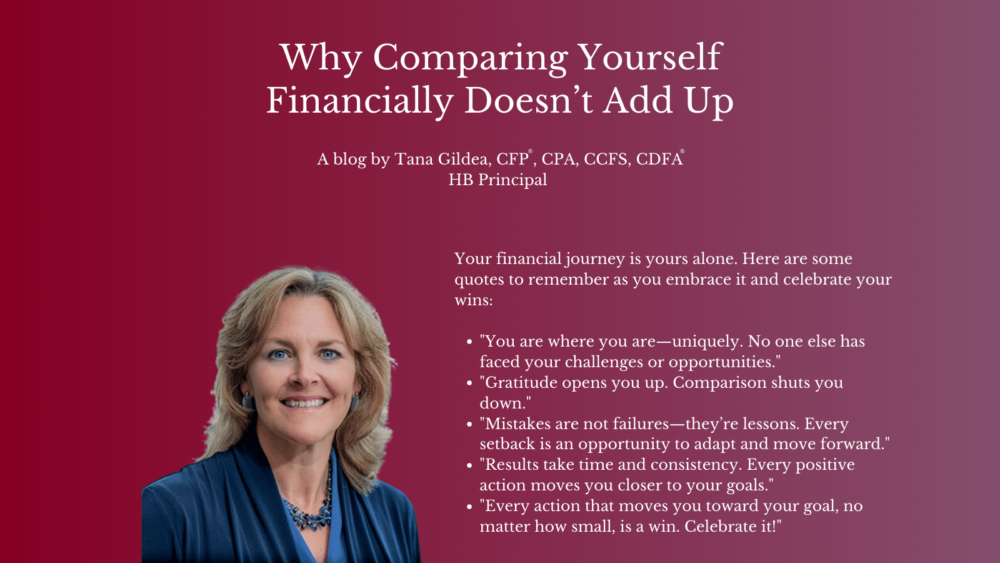I hear it all the time: “I know I’m behind in my savings,” or “I’m not where I should be financially.” Sound familiar? These feelings of comparison are incredibly common, fueled by societal norms and social media, which amplify the idea that there’s an invisible scoreboard tracking our lives.
It’s not just about finances, either. From career milestones to lifestyle achievements, we are bombarded with messages that others are smarter, richer, or living more fulfilling lives. This constant comparison can leave us feeling like we’re falling short in some way. Personally, I’ve felt it too—and in a business focused on managing wealth, it’s easy to feel inadequate.
The Trap of Comparison
Sure, some people do have significant wealth, whether through frugality, smart investments, or fortunate circumstances like stock options or inheritance. Yet, the reality of their lives often includes challenges we don’t see. Social media tends to highlight only the glamorous snippets, leaving us with an incomplete—and often idealized—view of their situations.
My mom used to tell me: “Quit looking up the street at everything others have; look down the street and see how little others have.” That’s wise advice, but perhaps an even better approach is to stop looking at the street entirely. Instead, focus inward, finding contentment in where you are while striving for your own goals.
Why Your Journey is Unique
Here’s the truth: You are where you are—uniquely. No one else on the planet has faced your challenges, seized your opportunities, or overcome your struggles. So how can you possibly compare yourself to someone else? Your financial journey is yours alone, and there is no “behind” or “ahead”—there’s only your path.
Practical Steps to Shift Your Perspective
Instead of dwelling on what others have, take these actionable steps to reframe your mindset and focus on your own growth:
- Take Stock of Your Finances: Write down your assets and liabilities to calculate your net worth. Date it and set a reminder to update it in 2–3 months. Progress starts with knowing where you stand.
- Practice Gratitude: Look at all you’ve accumulated—your home, investments, or even sentimental belongings. Gratitude opens your mind to abundance, while comparison and jealousy close you off.
- Reflect on Your Growth: Think about your situation 5 or 10 years ago. What lessons have you learned? If your financial situation hasn’t improved, use that as a cue to take action.
- Set Small, Actionable Goals: Focus on one small change you’d like to make. Write it down, break it into steps, and take the first step today. Momentum builds with small, consistent efforts.
- Focus on Positive Actions: Instead of obsessing over outcomes, celebrate the small wins. Results take time, but every positive action moves you closer to your goals.
- Reframe Negative Language: Track the words you use about money for a day. Replace any negative comments with more positive and abundant language. For example, instead of saying, “I’ll never save enough,” try, “I’m creating a plan to build my savings.”
- Embrace Your Hero’s Journey: Setbacks and mistakes are part of the process. View them as lessons rather than failures, and adjust your actions accordingly.
Celebrate Your Progress
Your journey is uniquely yours, and there’s no race or finish line. Take a moment to bask in how far you’ve come and dream about where you want to go. Even during tough times, there’s always something to be grateful for and a small step you can take toward your ideal future.
As Nelson Mandela once said, “I either win or I learn.” Every action that moves you forward is a win. Celebrate it and remember: the only person you need to compare yourself to is the version of you from yesterday.
To learn more or get help planning your financial goals, please email me at gildea@homrichberg.com.
Important Disclosures
This article may not be copied, reproduced, or distributed without Homrich Berg’s prior written consent.
All information is as of date above unless otherwise disclosed. The information is provided for informational purposes only and should not be considered a recommendation to purchase or sell any financial instrument, product or service sponsored by Homrich Berg or its affiliates or agents. The information does not represent legal, tax, accounting, or investment advice; recipients should consult their respective advisors regarding such matters. This material may not be suitable for all investors. Neither Homrich Berg, nor any affiliates, make any representation or warranty as to the accuracy or merit of this analysis for individual use. Information contained herein has been obtained from sources believed to be reliable but are not guaranteed. Investors are advised to consult with their investment professional about their specific financial needs and goals before making any investment decision.
©2025 Homrich Berg.













A Deeper Look At The U.S. Labor Market And How It Continues To Support Consumer Spending
Last month, we discussed how recent inflation data could influence the Federal Reserve’s (Fed) decision…
Read More